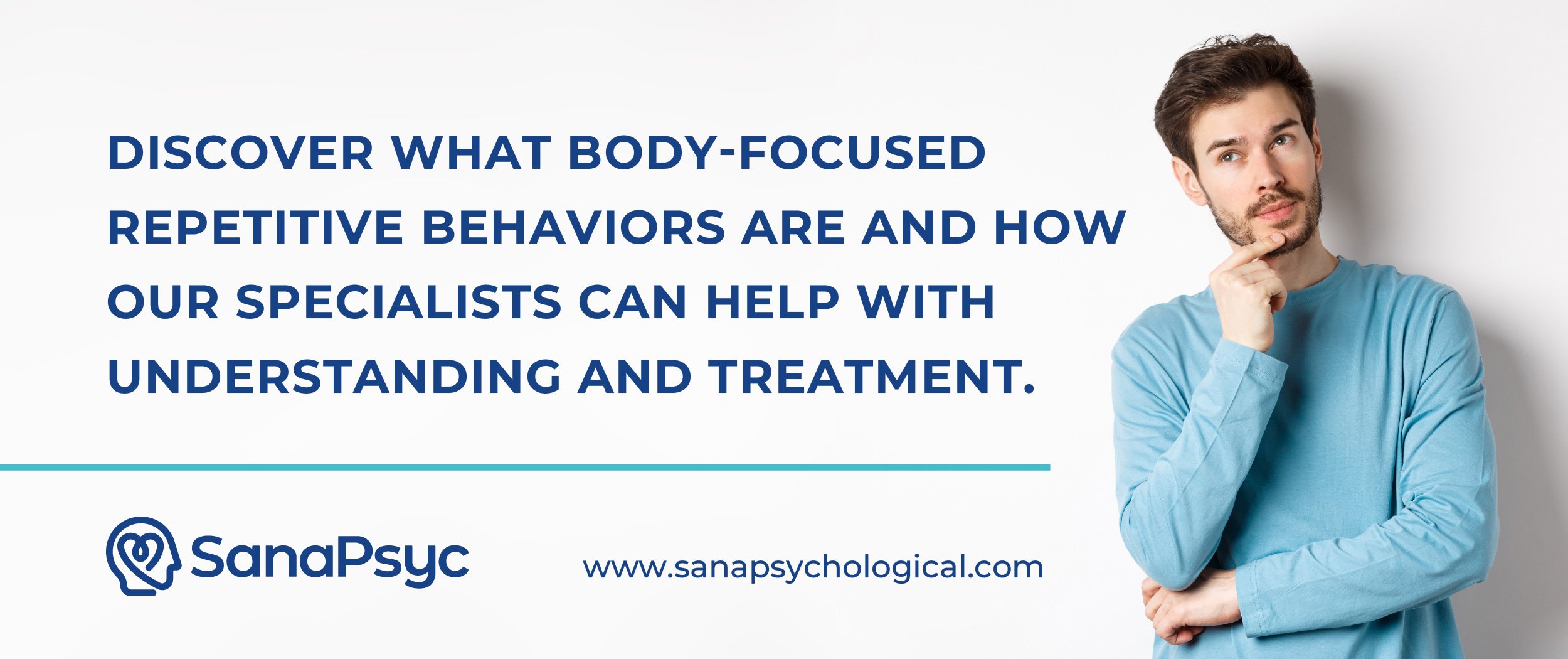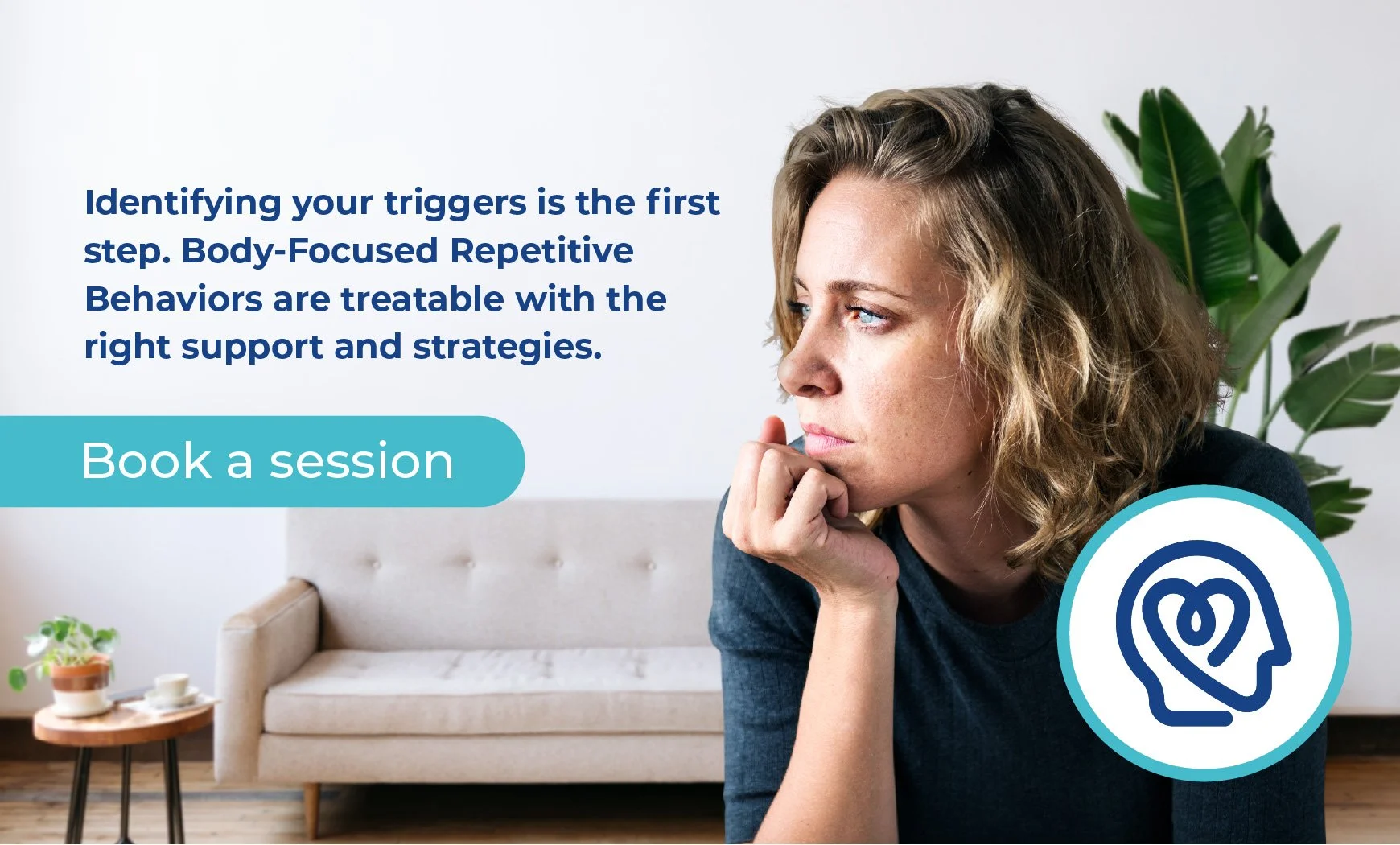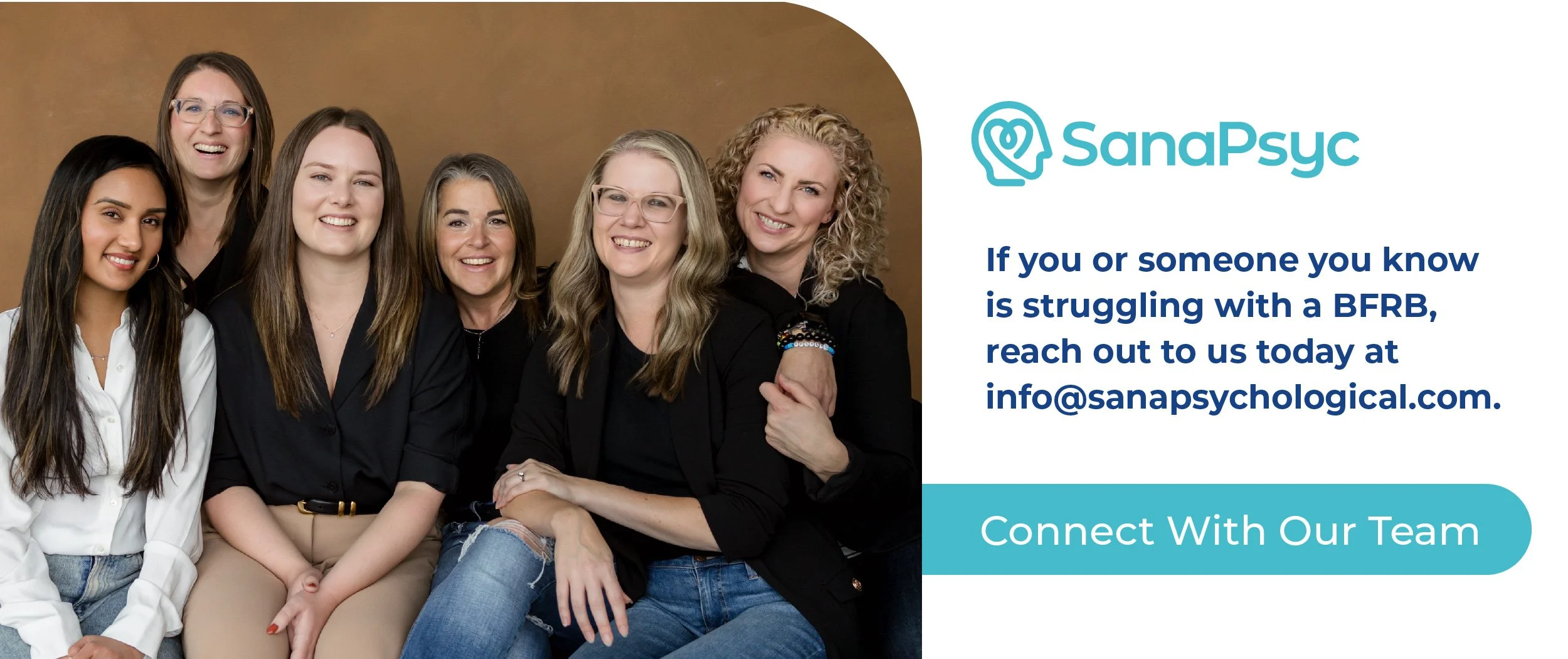Body-Focused Repetitive Behaviours from Anxiety Counselling Calgary Therapists
Body-Focused Repetitive Behaviors (BFRBs) are a group of behaviors that involve repetitive, impulsive actions that cause physical damage or discomfort. These behaviors are often unconscious and individuals who engage in them might not realize what they’re doing until damage is already caused. For example, someone may have pulled out a patch of hair on their scalp before becoming aware that they were pulling. While BFRBs are common, they are not always well understood and many people may feel isolated or ashamed about their behaviors. Even in seeking therapy, people may not feel well supported so it is important to find a practitioner who is well-versed in these behaviours who can help you bring forward change. The good news is that with proper understanding and treatment, BFRBs can be managed well and quality of life can be improved.
Interestingly, BFRBs are quite common (up to 15% of people experience them with it being theorized this is an even higher number but shame and embarrassment keep people from reporting it honestly). Yet, despite this, it is not commonly talked about or discussed-until now!
Even writing this blog as an experienced psychologist who has offered addiction counselling Calgary services for 15+ years, it is an area that I didn’t understand or find much support around. I’ve had to navigate my own experiences with nail biting and skin picking (particularly around the nail bed, to the point of bleeding and wounding) that it would have been nice to have more experienced support with. Hopefully you won’t have to do this on your own as I had to.
While BFRBs are not always generated by anxiety, we asked our specialists in BFRBs who are anxiety counselling Calgary therapists as well, to share more about these behaviours, what they are, and treatment.
Types of Body-Focused Repetitive Behaviors from Anxiety Counselling Calgary Therapists
BFRBs can manifest in a variety of ways with the most common types include:
Trichotillomania (Hair Pulling Disorder)
One of the most well-known BFRBs, Trichotillomania, involves compulsively pulling out hair from the scalp, eyebrows, eyelashes, arms, or other areas of the body. This can lead to noticeable hair loss and scarring which people often try to hide and cover up. This noticeable impact can lead to increased stress according to our anxiety counselling Calgary therapists.Dermatillomania (Skin Picking Disorder)
Dermatillomania is characterized by an overwhelming urge to pick at the skin, often leading to sores, scars, and infections. The behavior usually starts with picking at a perceived blemish which can then escalate/progress to involve healthy skin or scabs. Like hair-pulling, the behavior is often done unconsciously and may occur when someone is anxious, bored, concentrating or mindlessly engaging in another task that creates opportunity for picking, according to our anxiety counselling Calgary therapists.Onychophagia (Nail Biting)
Nail biting is another example of a widespread BFRB that can be seen in both children and adults. It involves biting the nails or the surrounding skin, often until it causes injury. In some cases, it can lead to infections or permanent nail damage. This is also something that is usually done unconsciously, though it may start with conscious intention to seek relief or attend to a hangnail or perceived abnormality in the nail area according to our anxiety counselling Calgary therapists.Mouth Biting or Cheek Biting
This type of behavior involves repetitive biting of the lips, inside of the cheeks, or the nails. Like nail biting, it can cause oral damage and become a source of chronic pain or discomfort.Hoarding or Picking at Scabs
Though slightly different from traditional BFRBs, this behavior involves picking at or hoarding scabs and wounds, leading to further physical harm and prolonged healing times.
Identifying Body-Focused Repetitive Behaviors
BFRBs can be difficult to identify because the behaviors often occur automatically or without full awareness. However, the following signs might suggest someone is dealing with a BFRB:
Visible damage or injury: Persistent hair loss, scarring, skin sores, or damaged nails might indicate a BFRB.
Repetitive nature: The behavior is usually done in response to stress, boredom, or other emotional triggers.
Attempts to stop the behavior: Many people with BFRBs try to stop or hide the behaviors but find they cannot control the impulse.
Feelings of guilt or shame: People often feel embarrassed or ashamed about their BFRB, which can lead to emotional distress or isolation.
Increased frequency: Over time, the behavior can become more frequent or more intense, leading to greater harm.
BFRBs are often triggered by emotional factors like anxiety, stress, or boredom. They may also be a form of self-soothing, a way for the individual to cope with overwhelming feelings or situations. Identifying the triggers is key to treatment
Treatment of BFRBs According to Anxiety Counselling Calgary Therapists
While Body-Focused Repetitive Behaviors can be challenging, they are treatable. Various strategies can help manage and reduce the frequency of these behaviors. Treatment approaches typically involve a combination of therapy, behavioral techniques, and, in some cases, medication.
The therapies that can be helpful for BFRBs include:
Cognitive Behavioral Therapy (CBT) (including Habit Reversal Training). These treatments can support individuals in becoming more aware of their behaviour, triggers, and teaching alternative responses rather than the BFRBs. CBT can also help individuals reframe unhelpful thought patterns and develop different coping mechanisms for the behaviours, emotions, and stress. Our anxiety counselling Calgary and BFRB therapists utilize these approaches often and notice that they help create freedom, change, and empowerment in individuals of all ages.
Relaxation techniques. These can help reduce stress, worry, and manage the emotions that may lead to the behavior, according to our anxiety counselling Calgary therapists who treat BFRBs. Practices such as meditation, yoga, clinical hypnotherapy or deep-breathing exercises are all examples of relaxation techniques that can help reduce stress, improve emotional regulation and encourage a focus on the present moment (mindfulness).
Acceptance and Commitment Therapy (ACT). ACT focuses on helping individuals accept their BFRB without judgment and commit to making meaningful changes in behaviour. ACT encourages mindfulness and awareness of the present moment and is often used in combination with other therapies.
Medication. Although no medications are specifically designed to treat BFRBs, some individuals benefit from medications that target underlying conditions, including anxiety, depression, ADHD, and/or impulsive behaviour. While anxiety counselling Calgary therapists cannot prescribe medication, they can talk through the pros and cons of considering this step as well as help monitor the effects of any medication you do try.
Support Groups and Peer Support. Connecting with others who are experiencing similar challenges, whether in person or online, can provide a sense of community and reduce feelings of shame. They allow individuals to share coping strategies and offer mutual encouragement.
Environmental Modifications. Making changes to one’s environment can help reduce triggers and active symptoms. This may include things like wearing gloves or bandages to prevent skin picking or nail biting; using fidget toys as an alternative outlet; and/or reminders like sticky notes or alarms to check-in on feelings and self to help increase awareness and promote change. For example:
Dos and Don’ts in Navigating BFRBs According to Anxiety Counselling Calgary Psychologists
As you navigate your journey with BFRBs, our anxiety counselling Calgary therapists who work with BFRBs have put together a quick list of things to do, and not do, to support your journey of change and wellness.
Do:
Ask for help
Get to know your triggers
Understand your condition
Engage in gentle habit shifting
Recognize the powerful impact of genetics, reinforcement and habit
Support self-care
Treat other mental health conditions, including depression, anxiety, OCD, addiction, ADHD, and trauma
Consider different treatments, including medication if that is appropriate for you
Don’t:
Blame, shame or guilt yourself
Tell yourself to ‘just stop’ (if you could have, you would have)
Minimize the impact of this behaviour
Ignore other mental health conditions
Suffer in silence
Isolate yourself
Feel alone
Ignore the issue
Hope it will get better with just time
Think change will be easy or happen overnight
Resources for BFRBs from Anxiety Counselling Calgary Therapists
Free From BFRBs Book Recommendations
Book ‘BFRBs for Kids: A Gentle Introduction to Body-Focused Repetitive Behaviors’ by Kate Blake
Book ‘Overcoming Body-Focused Repetitive Behaviors’ by Mansueto & Mansfield Vavrichek
Support at Sana Psychological from Anxiety Counselling Calgary Therapists
Body-Focused Repetitive Behaviors are often misunderstood and can lead to significant emotional and physical distress for those affected. However, with early identification and the right treatment plan, these behaviors can be managed and individuals can regain a sense of empowerment and freedom. Therapy, self-awareness, and a combination of coping strategies can make a profound difference in reducing the frequency and severity of BFRBs.
If you or someone you know is struggling with a BFRB, reach out to us today at info@sanapsychological.com for more information and support. Visit us at https://sanapsychological.com/ to learn more about our mental health and addiction recovery support options.
Sana Psychological is a private practice in Calgary, Alberta, Canada providing quality mental health and addiction counselling support. Our therapists specialize in their own personal areas of focus, including with BFRBs as well as anxiety counselling Calgary, OCD counselling Calgary, trauma counselling Calgary, addiction counselling Calgary, ADHD counselling Calgary, and more. Connect to our curated list of resources to help you get started or complement your mental health journey.



